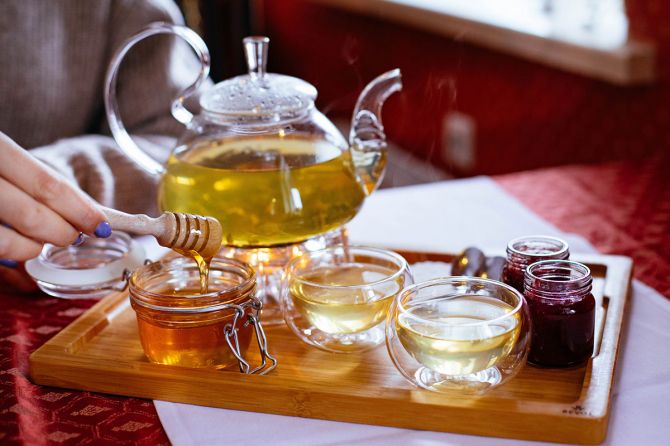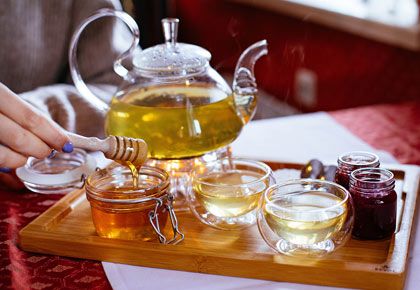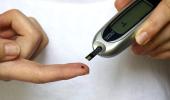Refined sugar can be replaced with fruits, dates, honey and artificial sweeteners like Stevia, suggests nutritionist Dr Eileen Candy.

Sugar, according to several health experts, is white poison.
If not consumed in the right amount, it poses great dangers to your overall health, both physically and mentally.
Diets high in sugar are related to an increased risk of heart disease, diabetes, obesity, and fatty liver as well as depression.
Sugar may also damage your oral health by feeding the harmful bacteria in your mouth, increasing your risk of cavities and gum disease.
However, you need not completely avoid sugar from your diet.
You may enjoy sweet treats occasionally if you follow a balanced diet with nutrient-dense foods like nuts, fruits, vegetables, lentils, and dairy.
Replacing refined sugar with some of the following sweet alternatives can help you keep a lot of ailments away.
1. Sugar alcohols
Sugar alcohols, also known as polyols, are a type of carbohydrate naturally found in fruits and vegetables.
Among sugar alcohols used as sugar alternatives include erythritol, xylitol, and maltitol.
Erythritol contains just 0.2 kcal/gm whereas sugar contains 4 kcal/gm.
Sugar alcohols may cause stomach upset when eaten in a large amount.
2. Monk fruit sweetener
Monk fruit extract is obtained from the Siraitia grosvenorii plant, which is native China, it is about 300 times sweeter than table sugar.
Monk fruit may control blood sugar spikes when used in place of regular sugar.
3. Allulose
Allulose, also known as D-allulose, is a monosaccharide that exists naturally in certain fruits.
It has 70% of the sweetness of table sugar and provides just 0.2 calories per gram. However, large doses may lead to abdominal pain, bloating and diarrhoea.
4. Dates
Dates are the dried fruits of the date palm tree.
This fruit is an excellent alternative to refined sugar and offer several health benefits.
Unlike refined sugar and many other sweeteners, dates are a good source of nutrients, including fibre, potassium, magnesium, manganese, vitamin B6, and carotenoid and polyphenol antioxidants.
Dates can be used to make barfis, energy bars, cakes, cookies, milkshakes, smoothies.
You can also use date paste or date syrup to sweeten the food items.
5. Applesauce and other fruit purées
Sugar can also be replaced by using fruit pulps like apple, banana, figs, prunes.
This is an excellent way to cut down refined sugar you’re your diet and replace with nutrient dense foods items which provide sweetness and nutrition.
Fruits are rich in vitamins, minerals and antioxidants.
Fruits also may reduce the risk of developing chronic diseases like heart disease, cancer.
When purchasing a packaged fruit pulp, make sure you choose an unsweetened one with no added sugar.
6. Yacon syrup
Yacon syrup is extracted from the yacon plant (Smallanthus sonchifolius), which is native to South America but is also made available in India.
It is similar to molasses and has less sweetness compared to refined sugar hence you may need more amount to match the desired sweetness.
Yacon also contains fructooligosaccharides which act as prebiotics and provide many health benefits such has helped the gut-friendly bacteria to grow and confer benefits for gut health.
However, consuming large amounts of Yacon may result in excessive gas, diarrhoea, and stomach pain.
7. Honey
Honey is a thick, golden liquid produced by honeybees.
It contains trace amounts of vitamins and minerals, as well as an abundance of plant compounds that provide anti-inflammatory and antioxidant benefits.
Yet, the types of plant compounds in honey depend on many factors, including the type of bee that produced the honey and the type of flower the bee was feeding on.
Honey compounds, such as honey polyphenols, may help modulate inflammation in your body.
Honey also has a slightly lower glycemic index (GI) than table sugar.
These qualities may make it healthier than refined sugar. If you choose to use honey, do so in moderation, as it's still high in natural sugar and calories.
8. Maple syrup
Maple syrup is a thick, sugary liquid that's made by cooking the sap of maple trees.
It contains a small amount of minerals, including calcium, potassium, iron, zinc, and manganese. Plus, it's rich in phenolic compounds like lignans and coumarins that may have anti-inflammatory and antioxidant effects.
Despite having beneficial nutrients and antioxidants, maple syrup is still very high in sugar.
It has a slightly lower GI than regular sugar, but — like any sweetener — should be used in moderation.
9. Molasses
Molasses is a sweet, brown liquid with a thick, syrup-like consistency.
It is made by boiling sugar cane or sugar beet juice. It contains many of vitamins and minerals, as well as many antioxidants and is a good source of minerals iron, potassium, and calcium, which are crucial for many aspects of health.
Overall, molasses makes a fine replacement for refined sugar, but you should limit your intake because it is still a form of sugar.
10. Stevia
Stevia is a natural sweetener that is derived from the leaves of the South American shrub Stevia rebaudiana.
It contains compounds called stevioside and rebaudioside, which do not contain any calories and are 450 sweeter than sugar.
While Stevia is considered generally safe, some studies suggest that it may not agree your gut microbiome.
Avoid these sugar substitutes
It is important to limit or avoid the following sugar substitutes:
Agave Syrup
It is a natural sugar and minimally processed made from the sap of the blue agave plant but it has 75-90% fructose, even more than high fructose corn syrup, which rapidly raises the blood sugar levels. You can opt for honey or stevia drops instead of agave syrup in your beverages.
Acesulfame Potassium
Researches report mixed information about the usage of this sweetener.
There may be various health concerns associated with inflammatory and chronic diseases. It may also be a risk for consumption during pregnancy.
High Fructose Corn Syrup
High Fructose Corn Syrup (HFCS) disguises itself as a “natural sweetener” but it is highly processed and has a high glycemic index.
HFCS is present many of the packaged food products ranging from canned foods and sauces, salad dressings, sweetened beverages, bakery products like breads, biscuits, breakfast cereals, crackers, sweetened dairy like yogurt.
With corn being one of the most common genetically modified crops, the majority of HFCS is produced using GMO (genetically modified) corn, but that is not the only problem.
Corn syrup is extremely high in fructose as the name suggests; it is in a highly concentrated form and it gets rapidly metabolised by the liver and can cause many diseases such as obesity, non-alcoholic fatty liver disease (NAFLD), insulin resistance which may also lead to diabetes.
HFCS is very different than the type of fructose you get when eating a piece of fresh fruit.
Fruits are not as highly concentrated and the fiber in it helps to slow down the absorption of sugar into the bloodstream.
Hidden Sugars
You may probably be eating more sugars through the hidden sources that are masked under scientific names.
These are majorly present in ready to eat cereals, bars, flavoured yogurts, salad dressings condiments and even fruit juices labelled with ‘no added sugar’.
The first step towards recognising them is to read food labels. Look out for synonyms of sugars like sucrose, dextrose, maltose, fructose, lactose, corn syrup, ethyl maltol on your food labels.
Common items containing hidden sugars are barbeque sauce, ketchup, spaghetti sauces, dips, chocolate milk, granola, flavoured coffees, iced teas, some protein bars, premade soups, canned soups, canned baked beans, packaged smoothies.
The best way to avoid hidden sugars in your meals is to make them at home so you know exactly what's in them.
However, if you need to buy prepackaged food, make sure you check the label to identify any hidden added sugars.
It is equally important to keep the glycemic index of sugar replacements in mind when evaluating different sugar replacements.
The glycemic index (GI) is a value used to measure how much specific foods increase blood sugar levels.
Understanding the glycemic index of foods help us to choose appropriate foods for daily consumption.
Several factors influence the glycemic index of a food, including its nutrient composition, cooking method, ripeness, and the amount of processing it has undergone.
Foods are generally classified as low, medium, or high glycemic foods and ranked on a scale of 0-100. The lower the GI of a specific food, the less it may affect your blood sugar levels.
The glycemic index of carbohydrate-containing foods are categorized as the following:
- Low: 55 or less
- Medium: 56–69
- High: 70 or above
Foods containing large amounts of refined carbohydrates are digested faster and have a high glycemic index while foods high in protein, fat, or fibre typically have a low GI. Foods that contain no carbs are not assigned a GI and include meat, fish, poultry, nuts, seeds, herbs, spices, and oils.
It is very important to keep in mind that the glycemic index is different from the glycemic load (GL).
Unlike the GI, which does not take into account the amount of food eaten, the GL factors in the number of carbohydrates in a serving of a food to determine how it may affect blood sugar levels.
For this reason, it’s important to take both the glycemic index and glycemic load into consideration when selecting foods to help support healthy blood sugar levels.
Dr Eileen Candy is head of department -- nutrition, and dietetics at Sir H N Reliance Foundation Hospital, Mumbai.

Disclaimer: All content and media herein is written and published online for informational purposes only. It is not a substitute for professional medical advice. It should not be relied on as your only source for advice.
Please always seek the guidance of your doctor or a qualified health professional with any questions you may have regarding your health or a medical condition. Do not ever disregard the advice of a medical professional, or delay in seeking it because of something you have read herein.
If you believe you may have a medical or mental health emergency, please call your doctor, go to the nearest hospital, or call emergency services or emergency helplines immediately. If you choose to rely on any information provided herein, you do so solely at your own risk.
Opinions expressed herein cannot necessarily provide advice to fit the exact specifics of the issues of the person requesting advice.










